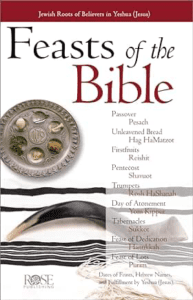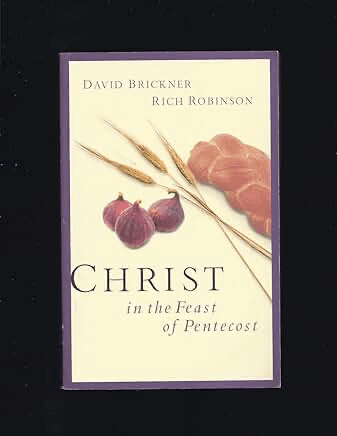
10 Ideas for a Christian Shavuot
Shavuot is one of the seven Biblical feasts listed in Leviticus 23. While many Christians don’t yet celebrate these important days, they’re so meaningful to our faith because all of them in some way point to Jesus as our Messiah!

Many Christians know Shavuot as Pentecost. The apostles were celebrating Shavuot when the Holy Spirit was given to them. As they praised God for giving His Law, He gave them the Holy Spirit, which enabled the Law to be written on hearts—theirs and ours!
The command to celebrate Shavuot includes bringing offerings to the Temple, which is not currently standing. Because of this, we can’t keep that command as stated in the Bible. But we can keep the tradition in order and focus on the themes of the celebration – God’s provision of both His Law and the Holy Spirit.
Since most of us aren’t yet experts at celebrating Shavuot, it’s helpful to have some ideas of how to observe it. Here are 10 great ways we can celebrate Shavuot as Christians.
1. Pray
As this is a celebration of the giving of the Holy Spirit, communicate with the Spirit in prayer. Ask for more of the Spirit’s influence in your life. Make sure to keep your heart open to what He has to teach you and convict you of.
To help you focus your prayers, the Holy Spirit’s roles include guiding, convicting, teaching, being the source of God’s power and wisdom in us, giving spiritual gifts, sealing our salvation, interceding for us, sanctifying us, and giving knowledge.
Shavuot is also known as the Feast of Proclamation so use this time to give praise to God. Proclaim that He’s your God and that you belong to Him. Proclaim His provision, salvation, and His commands given to set us apart.
2. Read the Stories
The themes of Shavuot include the giving of the Law, the giving of the Holy Spirit, and God’s provision, both for our spiritual and physical needs. A Jewish Shavuot tradition is to pull an all-nighter, studying the Bible around the clock! However you choose to study, here are some Bible selections to read to focus your mind and heart on the themes of Shavuot.
- The Law: Exodus 19; Psalm 1:2, 19:7-11, 29:18, 112:1-6, 119, 128; Proverbs 4:2, 6:20-23; Matthew 5:17-20; Romans 3:31; James 1:25
- Slavery in and rescue from Egypt: Exodus 3-15 (Summary here)
- Slavery to sin: John 8:31-35, Romans 6, 8:1-25; Titus 3:1-10
- Holy Spirit: Jeremiah 31:31-34; Joel 2:28-29; John 14:16-31; Acts 2; Romans 8:26-27
- Shavuot: Exodus 24:22; Leviticus 23:15-22; Acts 2:1
3. Rest
Since the command for Shavuot says that it should be a Sabbath, make rest a priority. This Sabbath differs from others in that food preparation is just fine, but it’s otherwise a time of rest. Be deliberate about choosing activities that promote togetherness and focus on God. Find some ideas in my post, “What DO we do on the Sabbath?”. Don’t let Shavuot go by without intentionally stopping and focusing on the God that provides!
4. Teach the Children
It’s so important Biblically that we pass our faith on to the next generation! If you don’t have children of your own, consider teaching your grandchildren or those at your church or synagogue about Shavuot and the amazing truths of God that it highlights. Here are some resources for children on the subject of Shavuot.
I use the Bible Pathway Adventures Activity Books for my own children and recommend them highly! This one covers the Feast of Shavuot and the other Spring Feasts—Passover, Unleavened Bread, and First Fruits. It also includes lessons on Jesus’s crucifixion and resurrection!
Kid-Friendly Crafts for Shavuot at PJ Library
PJ Library has provided our family with so many helpful resources for teaching our children about Biblical and Jewish holidays and traditions. This page has both crafts and recipes for kids that are relevant to the themes surrounding Shavuot.
5. Provide for the Less Fortunate
Within the command for Shavuot, God specifies that, when harvesting their fields, the Israelites were to leave the corners of the fields and not pick up the harvested grain that fell to the ground during the harvesting process. This was a provision for the poor, the widowed and otherwise, who were without the ability to produce their own food.
Today, provision for the poor looks very different, but we can still demonstrate this care for those who have similar needs in our culture and communities. Your church may have a food pantry that offers supplies to the needy in your community. Even small cities have food banks that are always grateful for donations. Crisis pregnancy centers provide necessities to mothers without the means to get what they need for their little ones. With so many ways to help available, it’s simple for us to reach out and see where we can help those less fortunate.
6. Celebrate Milk and Honey
One Shavuot tradition is to prepare dishes that are sweet and dairy-based. This is to remember God’s provision as milk and honey often symbolize in the Bible. God promised that He would bring the Hebrew people into the “land of milk and honey,” which meant the Promised Land. Of course, He kept His promise as He always does, and they did (eventually) get there!
He provided for them in their land, on the way, and He still provides for all of His people’s needs and will continue! Here are some recipes for dishes to serve during Shavuot to remind you and your family of God’s perfect provision.
This recipe is so versatile! You can top it with any fruit you like, ice cream, or chocolate shavings. The crust can be vanilla wafers, as called for in the recipe, or you can use an Oreo or Graham Cracker crust.
I love feta! This recipe would be a wonderful salad topping, could be included on a charcuterie platter, or served as an appetizer.

Kugel is a traditional Jewish recipe commonly served at Rosh Hashanah. This delicious kugel recipe is very similar to cheesecake, making it a fitting dish for Shavuot as well. My family likes this recipe, but it’s also the one I used when I won the kugel contest at our synagogue! Since this was only the second kugel I’d made in my life, winning surprised me more than anyone else there!
And if you’re brave enough to include some little ones in your Shavuot cooking, here are 7 Simple Shavuot Recipes Kids Can Make from PJ Library.
7. Serve Two Challah Loaves
While many serve two loaves of Challah bread on Shabbat (the Sabbath) weekly to celebrate God’s provision, Shavuot is another opportunity to celebrate it as well. Serving two loaves shows that God has given us plenty but also reminds us of the two loaves required as an offering in the Shavuot command in Leviticus 23.
Here is the Challah Bread recipe I use. It will make two medium-sized loaves or three small ones.

8. Have a Holy Convocation
Another part of the command in Leviticus, a holy convocation, is a get-together, not just for fellowship but to focus on God. During Shavuot, we focus on His blessings, His Laws, and His Spirit. This would be a great time to find a Messianic synagogue near you and visit if you don’t already have one. The UMJC and MCC both have directories if you need help finding one in your area. You could also have a Shavuot get-together with people from your church or Bible study. The focus here should be on worshipping and studying as a community of believers.
9. Get Baptized
If you’ve considered being baptized as an outward expression of your faith, and haven’t yet, Shavuot is a great time to do it! The significance of celebrating the indwelling of the Holy Spirit on the day of your baptism would be very special!
10. Make a Pilgrimage
Shavuot is one of three “pilgrimage festivals” in the Bible. The command for this says that all males should present themselves before the God of Israel and offer a sacrifice three times a year, on Passover, Shavuot, and Sukkot. Due to the Temple’s absence, we don’t offer sacrifices there on these days but any one of them would be a great time to plan a trip to the city of Jerusalem!
The things we celebrate at Shavuot – God’s provision, His Laws, and the Holy Spirit are so central to our faith as Christians! Check out my calendar for the dates of Shavuot for this year and make some plans to observe it, even if you never have. I bet you’ll find it deeply spiritual and be blessed by setting this time aside to focus on what God has given.
If Shavuot and its significance to our faith is a new concept for you, here’s some further reading on the subject. Written by David Brickner from Jews for Jesus, Christ in the Feast of Pentecost will give you a greater understanding of Shavuot and the countdown to it, as well as how they relate to our Savior.
Comments (2)
Leave a Reply Cancel reply
Search
Recent Comments
- Holy Branches on Explaining The Chosen: Season 2, Episode 1: Thunder
- robert silvernail on Explaining The Chosen: Season 2, Episode 1: Thunder
- Robin Meyer on Explaining The Chosen: Season 3, Episode 3: Physician Heal Yourself
- Joe on The Names of God: יהוה, the God of Israel
- Bradford on 9 Hebrew Words to Bring You Closer to God







the link to your calendar is not working
Thanks for bringing this to my attention! It’s now fixed. Here’s the link.